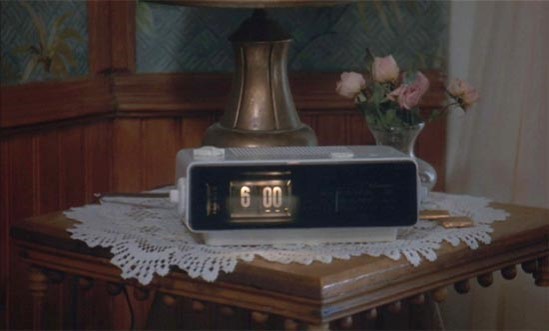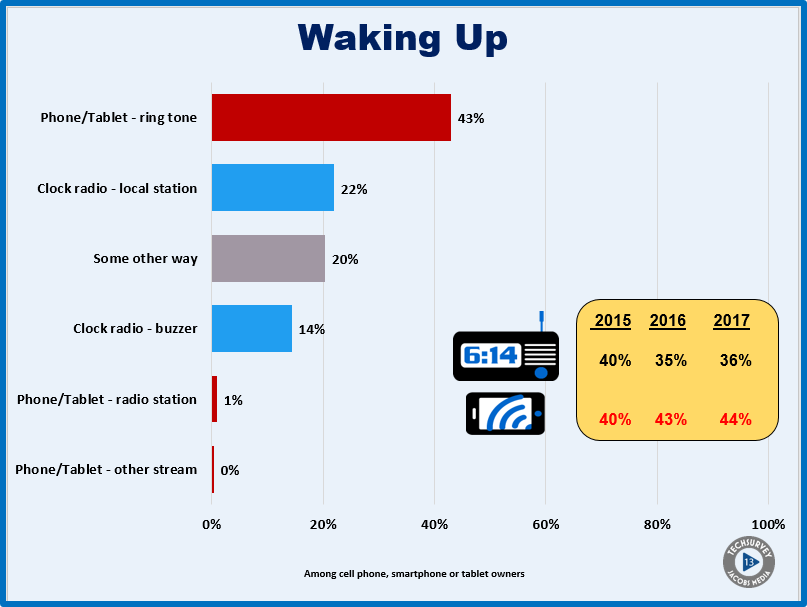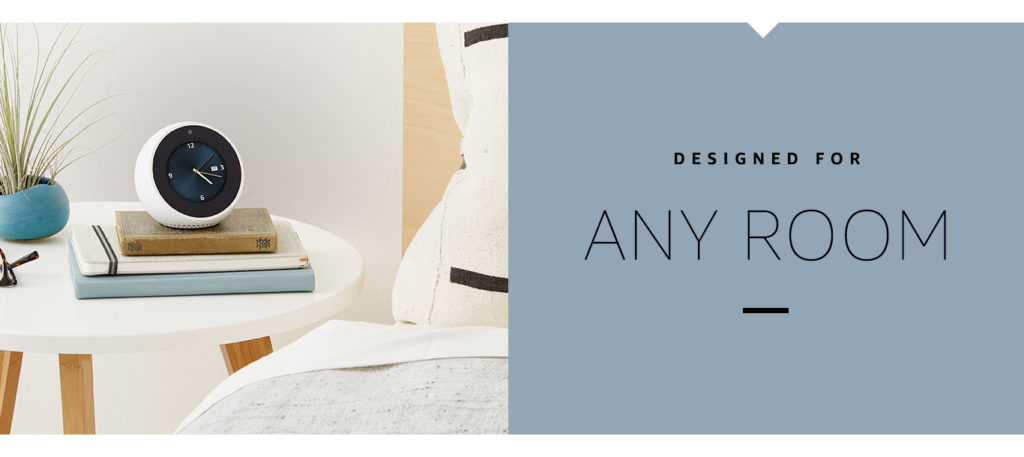
Radio has made its living over the decades by being the medium that started millions of mornings. In fact, that was the running joke in “Groundhog Day” as Phil Connors’ (Bill Murray) clock radio repetitively wakes him up to “I Got You, Babe” every day at 6a.m. – truly a living nightmare.
That much-repeated scene was the theme of the film, but also was a reinforcement for radio’s role as everyone’s waker-upper. When the film was released in 1993, radio owned mornings. Everyone had a clock radio anchored near their bedsides.
But then came mobile phones.
With each passing year, more people are waking up to ring tones on their iPhones and Galaxy S8s rather than that once-ubiquitous clock radio reliably blaring John Boy & Billy, “Morning Edition,” or Tom Barnard.
This year’s Techsurvey continues to track the inconvenient truth that mobile phones have become the device of choice for hauling oneself out of bed – especially among Millennials and their younger siblings.

A plurality now wakes up to a mobile phone rather than a clock radio. And the inset on the right shows the three-year trend line. With each passing year, mobile phones become the gadget of choice when it comes to morning wake-ups.
But now even that may be changing in the battle over “nightstand real estate.”
Say hello to Amazon’s newest device – the Echo Spot, described as the “stylish, compact Echo with a screen.” According to Amazon’s SVP of devices and services, David Limp, “They’re literally scattering them around the house, putting them in hallways, workshops and garages.”
According to Amazon’s SVP of devices and services, David Limp, “They’re literally scattering them around the house, putting them in hallways, workshops and garages.”
(Wait – isn’t that the way people used to use their radios?)
But as you can see in the website ad above, Spot looks pretty good bedside. And that’s one of the locations Amazon hopes it will wind up.
Echo Spot plays music, reads the news, provides weather forecasts and commute times – yes, all the services consumers have traditionally received from their clock radios. And because Amazon owns Audible, Echo Spot can also read you to sleep every night.
And like other devices in the Echo family, Spot connects you with Alexa – and “tens of thousands of skills.” As the splash page on Amazon’s website touts, Echo Spot is “a smart alarm clock.”
In case you’re wondering, Echo Spot was released on Wednesday, and is on the market for $129.99 (free delivery for Prime members), but you can expect juicy deals as we approach the holidays.
For radio stations, Echo Spot is both good and bad news. The clock radio was disappearing anyway, replaced by our obsession for connectivity with our smartphones. While the industry hopes (and prays) that Apple will somehow be compelled to turn on its FM chip, smart Echo devices are making their way into millions of homes – and bedrooms.
Now, being Alexa-accessible isn’t just a cool idea – it’s table stakes. But to truly get the most out of this technology and to earn a place in more dens, kitchens, and bedrooms, stations will have to address the less-discussed topic of how you compel Echo owners to actually use your skills. This is where the heavy lift comes, as we’ve learned over the last 8 years from developing – and marketing – smartphone apps.
Radio has been a big beneficiary of habit – becoming part of the fabric of people’s wake-up routines for decades. Now, we’ve got to go to school on this technology – both as radio companies and as an industry – because it’s moving very fast.
So, three things…
- We’re taking a group of radio execs on our Jacobs CES CEO Tour in January to see all this technology close-up. Alexa will be a big part of that journey. It’s essential to learn and understand how voice commands are making their way into consumer electronics, devices, and appliances – and how radio can benefit from this trend. It starts at CES2018. Join us.
- We’re about to launch Techsurvey14, fielding early next year. Your commercial radio station can participate, providing you with granular info on your station’s actual audience. This isn’t data from 35,000 feet – it’s the behavior of your listenership, whether you’re in Philly or Pensacola.
- Our newest company – SonicAi – develops skills for Alexa. But more than that, we approach this technology from both a programming and marketing standpoint. That’s key in not only developing skills that connect consumers to your brand, but also ensuring they actually use the skills you develop.
Drop me an email – I’ll be happy to talk with you about all this exciting stuff.
But whatever you do, now is not the time to hit “snooze.”
- Radio Listeners Don’t Get Tired Of Music, Only PDs And Music Directors Do - December 26, 2024
- It’s The Most Wonderful Time Of The Year - December 25, 2024
- Is Public Radio A Victim Of Its Own Org Chart – Part 2 - December 24, 2024




Might I suggest that radio has become so drab and boring that no one feels like they’re missing anything now. I used to listen to someone who was witty, interesting and played cool music, plus time checks and weather. That doesn’t exist in my state any more.
I don’t know where you live, Brian, but there is still is some great radio out there. Thanks for the comment.
Required reading in every section of every station…
Much appreciated, Tom.
Agreed.
Thanks for reading our blog, Carmen.
So good to see that you are realizing the realities of the times. Too many radio people (consultants included) want it to be like it was. In the newspaper business they had a saying, “publish or perish”. Now radio needs to “adapt or atrophy”.
There’s no going back, Dude. It ain’t 1985 anymore. And I think most people in radio “get” that. And your last line is right, although I think the more heavy-handed “innovate or die” isn’t a bad saying to keep in mind, too. Thanks for the comment.
Oh yes, Ive been saying for some time now that the only thing that scares the shit out of me (re: radio) are Siri and Alexa. THIS is the challenge to radio we should be paying attention to.
When you can roll over and ask Alexa to play the best alt hits of the 80’s while you’re waking up…. Well, fuck. Who needs Halloran?
Right, Max, the voice command technology is a huge challenge to radio, and Amazon (and others) will plow forward to dominate the home. Thanks for the comment.
Thanks for another great blog!
Thanks, Stroke!
VOX can be adapted to terrestrial – thru advanced Dropbox OS …etc…for FANS to participate in station activities beyond content programming. Give fans their main desire…choice and control.
BTW – Dude Walker 💯 correct.
Bruce, thanks for that comment.
Great wake up call, cannot snooze on societal paradigms (unavoidable) .. My question is why can’t radio provide formats people naturally demand, esp as tech allows for it??
Key demographics tell us 1980 is avg. Birth year. (37). There is more talent, less stars & more content than ever before in media history. Scattered industry always consolidates, scale. When provided in correct formats radio actually is back in the home for the first time in decades! Alexa will ‘play AM routine’ .. as a skill … Alexa has a ‘bath music’ skill.. for all ages.. a bed/nighttime skill, a dinner party… so forth. Radio media firms can provide all of this. Where do the ads come into play? 1980 doesn’t like ads. Advertising is changing, as always. But 1980 is more skeptical than anyone. And will be the first to PAY for free. Why? 4K OTA .. it will not be free. Local OTA has the choice to charge. HD remains free, 4K can charge. This is the actual FCC rule. So… The paradigm is changing as the definition of free is changing. From the alarm in a bedroom to the shower to a garage. Alexa Skills exist. Radio can also ‘broadcast’ multiple feeds, it’s not technically hard to do. The Audiences (37) under; are wide eyed, open minded, willing to try multiple solutions to augment ‘routines’. Keep a phone free… the $key$ dems want it on demand, are specific & curated (interactive) is better. One unspoken truth is the new standard is a ‘visual audio’ experience. Color the soul. It’s all they know. The distribution of visual/audio via an app, skill, wifi radio, net; anything ‘connected’. If ‘radio’ content is provided to the new access points; like Alexa; radio is still in the game. Recall radio has been out of the game at home… Alexa is opportunity when looking at it correctly. Cutting the cord/cable is about paying only for individual taste not waste & provides an ‘illusionary’ value in ditching ‘waste’ and freeing ‘time’. Time being the most important element, essentially. Am I wrong??
That’s what confuses me. Its not hard to cater to 1980 + ‘Radio’ is essentially a new option, for them. Ask any ‘lost gen’ 20 yr old about radio. Listen to their description. It’s harsh. When provided in the ‘modern’ format; radio reinvents. When you ask the same person to activate a ‘skill’ (it’s free!) which is essentially augmented radio, the perception changes. Decades melt off the ‘old persons’ radio stereotype. The customer is always right. If the last 15 years were all about coming back from the Napster, cannot repeat the same mistake in the Alexa era. Not when anyone can be included….
Who reading this blog would not love to be in a creative content role? Radio has a blank canvas and is more experienced. If a transistor radio or a Sony Walkman required supporting new technology standards, would the industry have ignored it? Feed skills with creative content and the money will follow. ‘Play lunchtime list B’ and don’t dare advertise to me over the music; use the skills visual aspects. Someone will; the right interactive skill can attract millions unlike any media tech prior. Ask Alexa, ‘Can you whisper’ ..